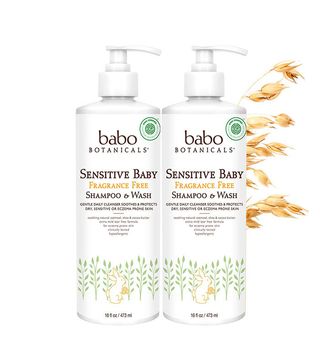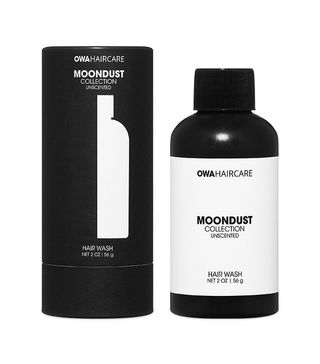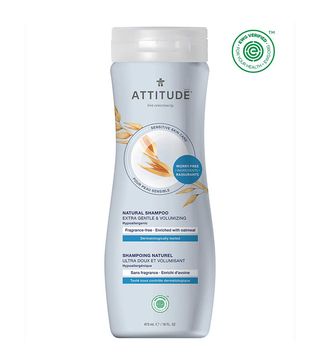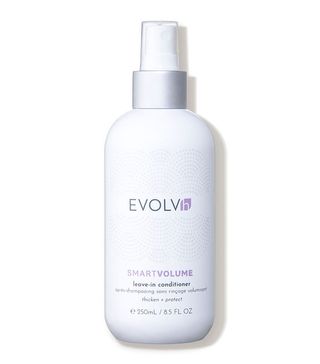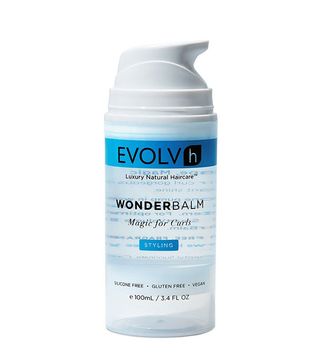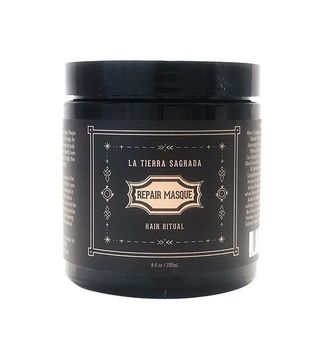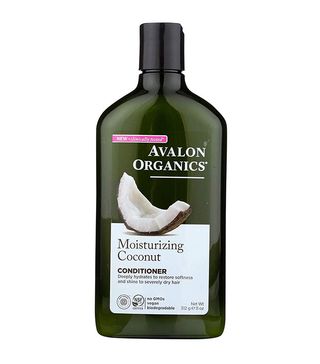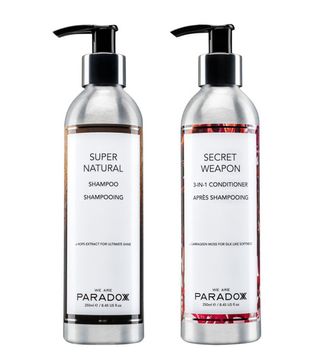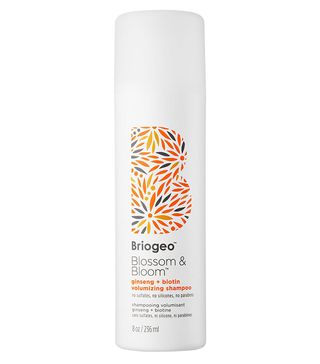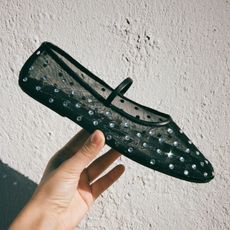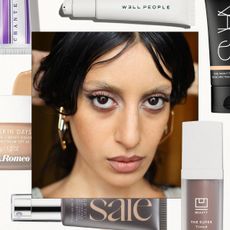I Made the Switch to Natural Shampoo—Here's What Happened

I’ll be the first to admit, in the past, I never really looked at the shampoo and conditioner I used. Somehow, I magically was also able to use ANY shampoo and conditioner and my hair turned out great (thankful for good thick-hair genes and being in beauty PR, which had its perks for trying different products). As long as it cleaned my hair and did its job, I was golden.
Fast-forward to a couple of years later when I discovered I was allergic to fragrance. Not only did I have to do a huge overhaul in changing my skincare, makeup, and even household cleaning products, but I had to change up my shampoo and conditioner. Most, if not all, conventional shampoos and conditioners contained fragrance or parfum—and some even had dozens of ingredients that can be potentially toxic to our health. Once I had to be on the lookout for this keyword "fragrance" on the back of tiny printed ingredients, I soon realized there were other words I should be cognizant of as well as they may be harmful to my health.
Soon enough, my haircare routine evolved from any old shampoo and conditioner I could grab with tons of hair products to a more simplistic routine of clean shampoos and conditioner with minimal natural styling products (if needed).
What Is Natural Shampoo?
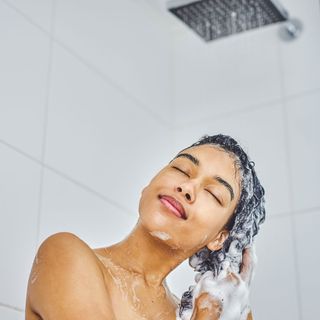
Let's break down what the difference is between "clean" shampoo versus regular shampoos. Most natural shampoos do not contain ingredients like parabens, phthalates, sulfates, dimethicone, and other cyclical silicones like cyclopentasiloxane. Instead, in natural shampoos, you might find plant-derived ingredients and natural fragrances (like essential oils). Some even contain adaptogens, plants and herbs that are said to reduce stress, and are already found in supplements and coffee alternatives. One brand, La Tierra Sagrada, uses adaptogens and other ancient ingredients like He Shou Wu, mucuna pruriens, cacao, horsetail, and black cumin seed oil in their hair products. What's in each shampoo varies, so do your research on the ingredients, and try to opt for bottles with minimal ingredients, or at least ones that you're familiar with.
"What we're looking for are alternatives for the commonly found ingredients in conventional products that may actually cause more harm than good," explains Kristen Bertiglia, merchandising manager at Credo Beauty. Bertiglia works closely with Credo Beauty Director of Environmental and Social Responsibility Mia Davis, as well as the company's co-founder, Annie Jackson, so she knows a thing or two about natural products.
What Happens When You Try a Natural Shampoo?
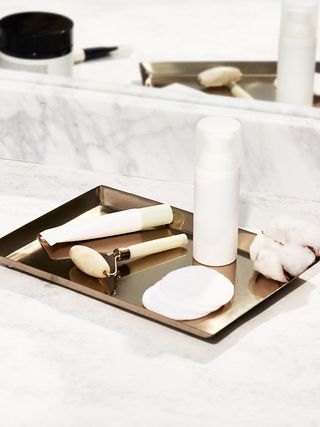
During my own personal search and exploration, I tested different natural shampoos and conditioners. I soon learned that making the switch also changed my in-shower experience. Most of us lather up our hair in a sudsy wash, which gives a squeaky-clean feel. When I started using natural shampoos, it was a mental shift because I really didn't get a giant pouf of bubbles. However, after a couple of washes, I slowly got used to it, and my hair began to adapt as well.
But there's a misconception that natural shampoos do not clean your hair as well as the other products. However, that's not true, Bertiglia says. When you lather up with conventional shampoos, the chemicals in them can actually strip away your natural oils, which could leave your strands dry and brittle. "[Clean] brands are infusing their products with even more active ingredients to go beyond the surface of the hair and address scalp health and work to repair and strengthen the hair cuticle from the inside out," explains Bertiglia.
When you're transitioning from regular to natural shampoos, your scalp might feel itchy or oily as it gets used to the new formula. You also might find you have to try a few different brands before you find the perfect fit.
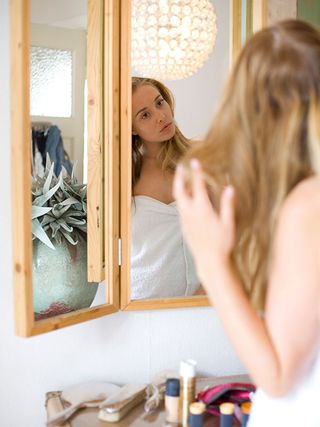
When choosing my products, I personally look for things like the EWG-verified seal, which is a great indicator that you have a solid clean product in your hands. The Environmental Working Group's core focus is to help make the purchasing decision for every household easier—filtering out products with harmful and toxic ingredients and only approving ones that uphold its standard and criteria. It also has a mobile app that makes shopping easier—you can scan a product and get information instantly.
What's Next in Natural Shampoos
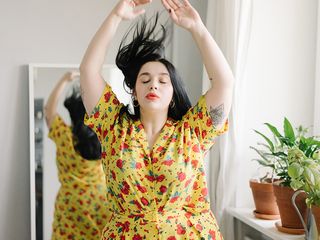
Bertiglia sees some more advancements in the natural shampoo space. "For the most part, we're seeing many hair brands turn to natural fragrance or essential oils to fragrance their products, if they are scented at all, since these ingredients can often address multiple concerns," she says.
And there's a focus on sustainability. Bertiglia shares that more brands are working toward using less water in their formulations, which leads to super-concentrated and active formulas. "In the case of OWA Haircare, it doesn't formulate with water at all, so it's actually able to reduce its carbon footprint and use less packaging overall," she says.
Now that you know more about them, want to give natural shampoos a try? Take a look at some of our picks below (and some other natural haircare products).
Disclaimer
This article is provided for informational purposes only and is not intended to be used in the place of advice of your physician or other medical professionals. You should always consult with your doctor or healthcare provider first with any health-related questions.
-
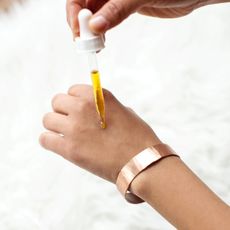 The Owner of a Green Spa Shared the 10 Items She Will Never Use Again
The Owner of a Green Spa Shared the 10 Items She Will Never Use AgainYes, you can get healthier items at the drugstore.
By Stephanie Limiti
-
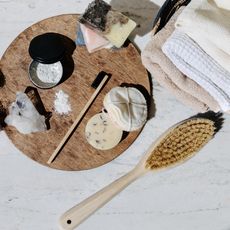 14 Brands to Shop If You Want to Reduce Your Carbon Footprint
14 Brands to Shop If You Want to Reduce Your Carbon FootprintCurrently in our carts…
By Stephanie Limiti
-
 Do These 3 Helpful Things If You're Making the Switch to a Natural Deodorant
Do These 3 Helpful Things If You're Making the Switch to a Natural DeodorantPlus, some shopping tips.
By Sarah Yang
-
 3 Alternative Period Products for the Tampon-Averse
3 Alternative Period Products for the Tampon-AverseWe've come a long way.
By Audrey Noble
